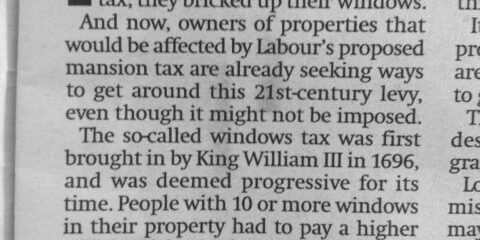I came across this little reference last week in the context of Labour’s proposed mansion tax in the UK. I love these titbits that give insight into our everyday language! The idea that we could use these expressions so easily, yet have no idea as to their origin seems incredible to me. And so it inspired a blog post exploring the history and background behind some phrases we use on a day to day basis. I mentioned the term ‘daylight robbery’ to a client this week, and followed it up with its history – it was a great ice breaker. So without further ado…
Breaking the ice
Meaning: To break down formalities when meeting new acquaintances
Origin: A phrase that dates back to the 17th century, when ice breakers literally broke the ice to allow for navigation of boats. It quite literally allows for the forging of ‘a path for others to follow’. Ice = stiffness; breaking of = allows for movement or more free flowing conversation in potentially socially awkward conversations.
Take a back seat
Meaning: Have minimal involvement in something
Origin: I personally always thought this was a car reference, but no – the meaning originates from parliament, where, in the House of Commons, less senior politicians sit at the back and play a less active role in political discussion.
Over a barrel
Meaning: To be at someone’s mercy
Origin: The Spanish Inquisition cites the first reference to this one, where one particular form of torture involved suspending terrified prisoners over barrels of boiling oil. If the victim didn’t comply with demands, he would simply be dropped in. Ouch.
Up to scratch
Meaning: Meeting the required standard
Origin: Now a commonplace term in the office, this originated from boxing. Fighters would meet at a line scratched in the ground – failing to come up to scratch represented automatic defeat.
Fair Dinkum
Meaning: Honest, genuine, fair play
Origin: Never a truer Aussie expression was said, right? Wrong. Sorry Aussies, but even this one harks back to the poms. Lincolnshire to be exact. ‘Dinkum’ is a slang term that appears to have originated from ‘honest toil’. ‘Fair dinkum’ was used by the colliers of the UK’s East Midlands from the 1880s and by Australians a few years later. In the late 19th century, in addition to the numerous criminals who were transported, many mineworkers migrated from England to Australia, taking their working language with them.
Rule of thumb
Meaning: A means of estimation made according to a rough and ready practical rule, not based on science or exact measurement.
Origin: The ‘rule of thumb’ has been said to derive from an English law that allowed a man to beat his wife with a stick so long as it is was no thicker than his thumb. Admittedly, this is not proven, but highly likely that it refers to one of the numerous ways that thumbs have been used to estimate things – judging the alignment or distance of an object by holding the thumb in one’s eye-line – for example.
Mad as a hatter
Meaning: Crazy, mad, mental
Origin: Mercury used to be used in the making of hats. This was known to have affected the nervous systems of hatters, causing them to tremble and appear insane. The use of mercury compounded in 19th century hat making and the resulting effects were well-established – to the extent that mercury poisoning is still known today as ‘Mad Hatter’s disease’.
On your tod
Meaning: On your own
Origin: A great example of an origin directly derived from cockney rhyming slang. (on your tod -> on your Tod Sloan -> on your own). James Forman (Tod) Sloan was born in Indiana in 1874 and overcame neglect and poverty in his early life to become a highly successful jockey, only to experience a rather spectacular fall from grace in later years. It’s rather poignant that Sloan’s name should have become synonymous with solitude as both his early and later life seem pretty lonely and depressing, poor chap.
To think outside the box

Meaning: Also known as thinking outside the square, to think outside the box requires stretching the boundaries of traditional thinking
Origin: While the expression works pretty well metaphorically, it actually dates back to a simple game known as the nine dots puzzle. Created in the early 20th century, the aim of this game is to draw in one stroke no more than 4 straight lines through a square shape consisting of nine points. I’m not going to give you the answer, but have a go because – you guessed it- it involves drawing outside of the box.
Wouldn’t touch it with a ten foot pole
Meaning: Wouldn’t go near something, consider it revolting
Origin: A humdinger I recently found out on a trip to New Orleans. Early settlers there had the fright of their lives when their dead would quite literally float to the surface of the ground after big storms. Fortunately they realised this is because the city is actually six feet below sea level (as opposed to a zombie attack). To solve the problem of their floating dead, the Spanish settlers developed the burial system still in place today. The tomb is opened and the casket placed inside for a year and a day. After that time, the sheer heat forces the entity to decompose to a point where an undertaker can push it to the bottom of the tomb with a ten foot pole, making way for the next casket.
Do you have any other gems you’d like to share? Please get in touch if so!




